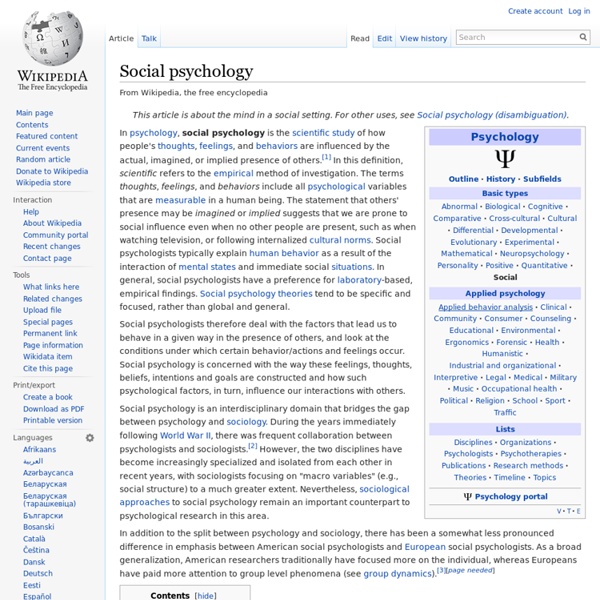Social psychology

Social influence
Morton Deutsch and Harold Gerard described two psychological needs that lead humans to conform to the expectations of others. These include our need to be right (informational social influence), and our need to be liked (normative social influence).[3] Informational influence (or social proof) is an influence to accept information from another as evidence about reality. Informational influence comes into play when people are uncertain, either because stimuli are intrinsically ambiguous or because there is social disagreement. Normative influence is an influence to conform to the positive expectations of others. In terms of Kelman's typology, normative influence leads to public compliance, whereas informational influence leads to private acceptance. Types[edit] Social Influence is a broad term that relates to many different phenomena. Kelman's varieties[edit] 1) Compliance[edit] 2) Identification[edit] 3) Internalization[edit] Conformity[edit] Minority influence[edit] Reactance[edit]
What is the new sociology of Ideas ? A Discussion with Charles Camic and Neil Gross - Transeo Review
Humanities are not so common an object of investigation for social scientists. Other disciplines (intellectual history, political science or even philosophy) tend to challenge the accounts produced by sociologists. Moreover, the sophistication of disciplines such as philosophy or economic analysis can sometimes be a barrier for sociologists working on them. Charles Camic : Although I “turned” about 10 years ago to using the expression “sociology of ideas” to describe my work, I’ve actually been doing research in this vein onward from my time in graduate school. When I was a sociology graduate student at the University of Chicago in the mid-1970s, my initial interests were social theory and the sociology of education. As I began reading the sparse literature that then made up the sociology of knowledge, however, I was quickly disabused of this expectation. Neil Gross : Any sociologist of ideas worth his salt will naturally be suspicious of the autobiographical narratives of intellectuals.
Cousins of Neanderthals Left DNA in Africa, Scientists Report
The geneticists reached this conclusion, reported on Thursday in the journal Cell, after decoding the entire genome of three isolated hunter-gatherer peoples in Africa, hoping to cast light on the origins of modern human evolution. But the finding is regarded skeptically by some paleoanthropologists because of the absence in the fossil record of anything that would support the geneticists’ statistical calculations. Two of the hunter-gatherers in the study, the Hadza and Sandawe of Tanzania, speak click languages and carry ancient DNA lineages that trace to the earliest branchings of the human family tree. The third group is that of the forest-dwelling pygmies of Cameroon, who also have ancient lineages and unusual blood types. The geneticists, led by Joseph Lachance and Sarah A. Tishkoff of the University of Pennsylvania, decoded the entire genomes of five men from each of these groups. Among the DNA sequences special to pygmies, Dr. Dr. Dr. A co-author, Joshua M.
Related:
Related:



